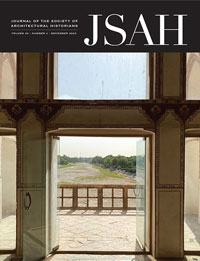-
Membership
Membership
Anyone with an interest in the history of the built environment is welcome to join the Society of Architectural Historians -
Conferences
Conferences
SAH Annual International Conferences bring members together for scholarly exchange and networking -
Publications
Publications
Through print and digital publications, SAH documents the history of the built environment and disseminates scholarship -
Programs
Programs
SAH promotes meaningful engagement with the history of the built environment through its programsMember Programs
-
Jobs & Opportunities
Jobs & Opportunities
SAH provides resources, fellowships, and grants to help further your career and professional life -
Support
Support
We invite you to support the educational mission of SAH by making a gift, becoming a member, or volunteering -
About
About
SAH promotes the study, interpretation, and conservation of the built environment worldwide for the benefit of all
NHA Quarterly Column: Building Relationships with the New Congress
Jan 10, 2019
by
Beatrice Gurwitz, Deputy Director, National Humanities Alliance

This Quarterly Column from NHA, published in November 2018, offers five concrete actions for humanities advocates to get attention for their priorities and build strong relationships with the new Congress.
More than 90 new Members of Congress are in the process of hiring staff and setting up their offices. Returning Members are defining their priorities for the 116th Congress and jockeying for leadership positions. In the midst of all these changes, how can humanities advocates get attention for their priorities and build strong relationships with the new Congress? When is the right time to reach out and to whom?
At the National Humanities Alliance (NHA), we set out to answer these questions through a webinar open to all of our members and to their membership as well. On the webinar, NHA’s executive director, Stephen Kidd, interviewed Leigh Whittaker, legislative assistant to Representative David Price (D-NC), and Kristen Adams, associate director of federal relations at Cornell University and a former Hill staffer. Over the course of the conversation, Whittaker and Adams identified five concrete actions for advocates to take to ensure that Members of Congress, old and new, understand the importance of federal funding for the humanities.
- Reach out to campus federal relations officers
College and university federal relations officers are charged with building relationships between their institution and Congress. Adams and her team at Cornell are currently preparing welcome packets for New York’s five new Members of Congress that will outline all facets of Cornell’s research and research funding as a “first step in our relationship building.” While federal relations officers at other schools are involved in similar endeavors, Adams notes that not all are as cognizant of the importance of federal funding for the humanities. She encouraged faculty and administrators to reach out to their federal relations officers to share information about the humanities on campus, especially any federal grants, along with stories and data on their impact. This will help federal relations officers build and share a narrative on the importance of the humanities on campus and in the community with Members of Congress.
- Identify the staffer responsible for the humanities in your congressional offices
Whittaker suggests calling Washington D.C. congressional offices and asking which staffer handles the arts and humanities and requesting their email address (most offices will oblige). You can then send the appropriate staffer an email outlining the importance of federal humanities funding and requesting a phone call. For returning Members of Congress, she suggests doing so any time between now and January but giving new Members of Congress and their staff until February to get settled. For the new Members of Congress, Whittaker explains that asking “who handles the arts and humanities will get freshman Members to think, ‘oh, who will I get to handle that.’” Once contact has been made, both Adams and Whittaker suggest reaching out periodically to flag new grants or an op-ed published in a local media outlet—anything that can connect the humanities with the Member’s broader policy goals. Kidd added that NHA is available to help in identifying these connections for your Members of Congress.
- Encourage Members to join or rejoin the humanities caucus
Representative David Price is the co-chair of the Congressional Humanities Caucus, and Whittaker is the lead staffer. The caucus plays a key role in introducing congressional staffers to the importance of the National Endowment for the Humanities (NEH) by hosting monthly Humanities Recess Events. These events include private tours of Washington’s cultural institutions—most recently a Capitol ghost tour—that highlight connections to NEH funding. In January, Whittaker will be asking all current members of the caucus to rejoin in the new Congress. In February, she will be recruiting new members at a “caucus fair” for freshman Members. Constituents can help her recruitment efforts by reaching out to their congressional offices and asking them to join or rejoin the caucus--again, in January for returning members and February for freshmen. Current members of the caucus can be found here.
- Sign up for the NHA Annual Meeting and Humanities Advocacy Day
The NHA Annual Meeting and Humanities Advocacy Day brings together humanities advocates from around the country to explore best practices in year-round humanities advocacy and to visit Hill offices to advocate for increased federal humanities funding. It is an opportunity to connect in person with humanities staffers, encourage Members to join the Congressional Humanities Caucus, and ask them to sign on to a letter encouraging increased appropriations for the NEH and other humanities priorities. For Whittaker, the event is essential to her efforts to recruit for the caucus and garner support for increased funding. Adams, as a government relations officer, has participated in the event for the last several years and has visited New York’s Members of Congress with other advocates from New York. Given that there are so many new members, Adams underscored that attending Humanities Advocacy Day this year is particularly important to educate all the new staff. She also noted that it was a great opportunity to connect with government relations officers, many of whom participate in the event and are even more likely to participate if faculty from their campus are attending.
- Find ways to engage with the Member of Congress in the district
For those who cannot make it to Washington to advocate this March, try to find a time to build an in-person relationship at home. Adams noted that seeing the humanities first hand, in their district, allows Members to say “Oh, I remember going to someone’s campus,” when a question relating to humanities funding emerges. Now is the time to identify an event—a museum opening, a humanities center lecture, an opening or closing reception for a grant-funded program—that a Member or their staff could be invited to over the next year. NHA also works with local partners to organize in-district meetings that bring together Members of Congress with NEH grantees and other members of the humanities community to discuss the local impact of the NEH. Kidd encouraged anyone interested in partnering on one of these meetings during the 116th Congress to reach out to NHA. He also called attention to NHA’s District Advocacy Guide that offers tips for scheduling in-district meetings and events.
Over the last few years, advocacy efforts like those Adams and Whittaker suggested have generated bipartisan support for increases to federal humanities funding. What’s more, advocates have found the opportunity to convey the importance of the humanities to Members of Congress and their staff to be empowering and rewarding. Getting an early start on advocacy in the new Congress will help build the sustained relationship needed to push for additional increases over the next two years.


